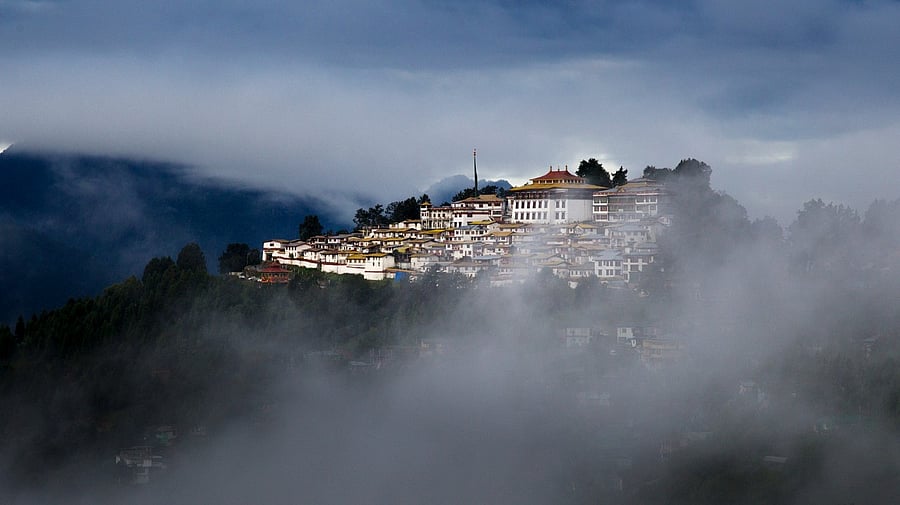
Arunachal Pradesh.
Credit: iStock Photo
A video circulating on social media, in which a crowd was seen publicly declaring Arunachal Pradesh a Christian state, recently sparked anger and concern among many in the tribal-dominated hill state. Although the authenticity of the video remains unverified, the root of the anger and fear lies in the Bharatiya Janata Party-led government’s renewed push to implement an anti-conversion law—46 years after its enactment.
Reacting sharply to the development, many demanded that the Pema Khandu government take strict action against those who publicly tried to assert influence of a particular religion in a state where people prefer to identify themselves with a tribe or a clan rather than with any religion. “The root of the ongoing tension is the government’s move to implement the anti-Christian act. We are totally against it,” Tarh Miri, president of Arunachal Pradesh Christian Forum, told DH from the state capital, Itanagar. “This may create tension along religious lines, which is so far absent in our state,” he said.
Supporters of the law, however, argue that the “rapid spread” of Christianity is the reason behind the tension and the fear among those practising indigenous faiths.
The 1978 Act
The Arunachal Pradesh Freedom of Religion Act (APFRGA), which prescribes punitive action against forceful conversions, was passed way back in 1978 but remained unimplemented due to the absence of specific rules. Several past attempts by the state government to formulate these rules triggered tensions and did not materialise. However, the Khandu government moved ahead following an order of the Itanagar bench of Gauhati High Court in September 2024. The high court issued the order following a public interest litigation (PIL) filed by a lawyer, Tambo Tamin. The court directed the government to implement the Act within six months. Given the tensions and protests, however, the state government is expected to seek more time.
Rise of Christianity
The rise in Christian population in the frontier state from less than 1% in 1971 to over 30 per cent in 2011 (Census) has resulted in fear among those practising indigenous faiths such as Donyi Polo, Amik Matai and Rangfraa, who worship the Sun, Moon and nature. The population of the indigenous faith, on the other hand, declined from over 60 per cent to less than 30 per cent between 1971 and 2011.
“We are losing our indigenous identity due to rapid conversion to Christianity. We are not against any religion, but none should be forced to convert. We want the government to implement the Act to check the use of force or fraudulent means being adopted for conversion,” Maya Murtem, general secretary of the Indigenous Faith and Cultural Society of Arunachal Pradesh, told DH. “The government should immediately conduct a census to find out how fast our numbers are declining.”
Politics of religion
Although the BJP-led government claims that the 1978 Act is not against any religion, the Christian Forum calls it a move against them. “Religion is an individual freedom guaranteed by India’s Constitution. And no Act should try to stop someone from accepting a religion,” Miri said. “Christian population in the state may be about 50 per cent now. In some districts, such as Papumpare (the state capital region), it is over 80 per cent. How can the government go against demands by the majority of the people?” he asked.
Some observers in the state believe although the fresh move is based on an order of the High Court, the ruling BJP is trying to cash in on the sentiments among those practising indigenous faiths and get them on board of its Hindutva agenda. Although the indigenous faith believers are not Hindus, the BJP and the Rashtriya Swayamsevak Sangh are trying to get them into their fold. This, they said, would further cement the saffron party’s grip over Arunachal Pradesh politics.
The BJP was elected to power for the third term in 2024 with 46 out of 60 Assembly seats. The saffron party also won both the Lok Sabha seats. The party, at the same time, is cautious given the growing clout of Christians in the state politics and their support for the BJP.
RSS’ role
As tensions over the Act escalated, RSS chief Mohan Bhagwat met leaders of the indigenous faith groups near Itanagar on March 1, in which the hardline Hindu leader reportedly put his weight behind their fight for implementation of the act. The RSS is trying hard to reach out to the tribals, who have converted from indigenous faith to Christianity in the past few decades. “RSS is taking up its ghar wapsi campaign in a big way in Arunachal Pradesh, and this Act can be helpful,” according to a local Congress leader.
The Christians in the state fear that
the implementation of the Act may give a push to the demand by RSS-affiliated organisations to strip their Scheduled Tribe status and the State benefits they get as tribals.
With the Christians frequently taking to protests on the streets, Chief Minister Khandu recently said the government would hold consultations with all the groups and stakeholders before formulating the rules. But Miri told DH that they are not just against the rules but want the 1978 Act be scrapped.